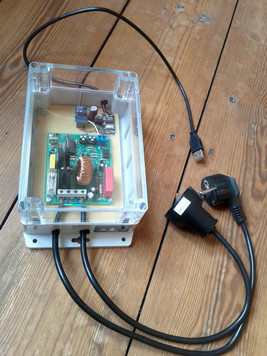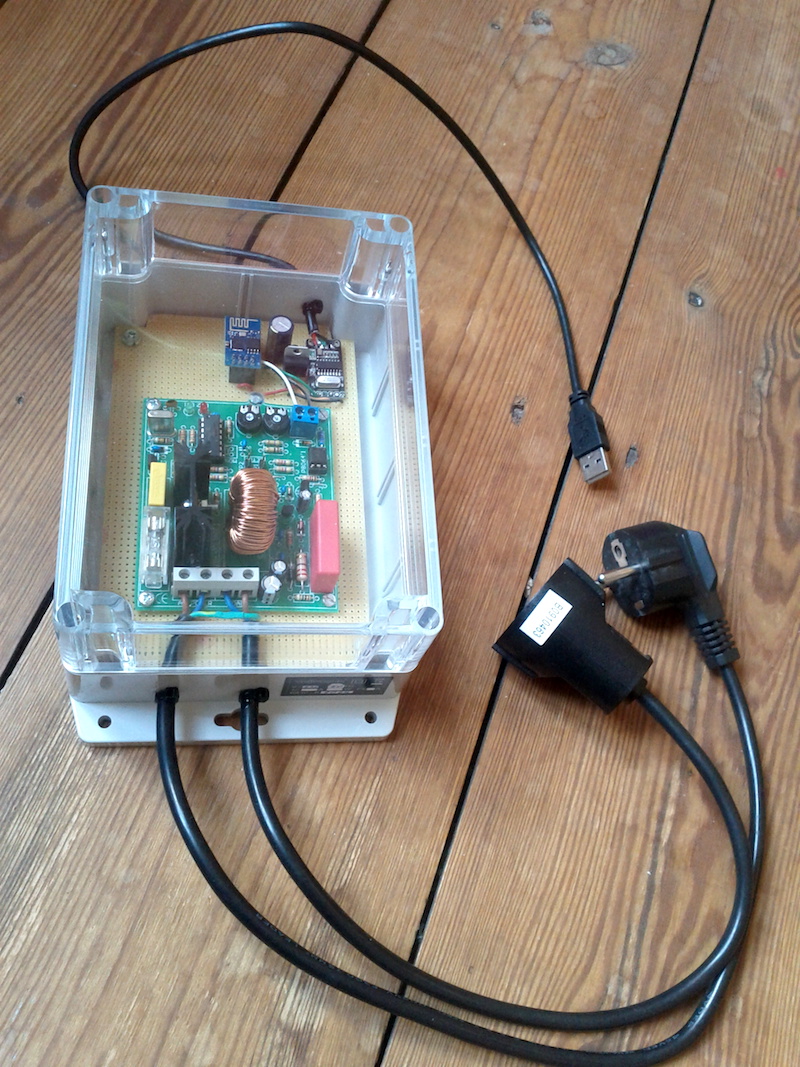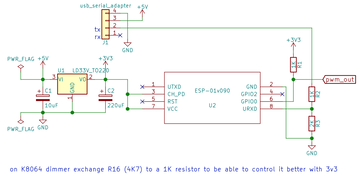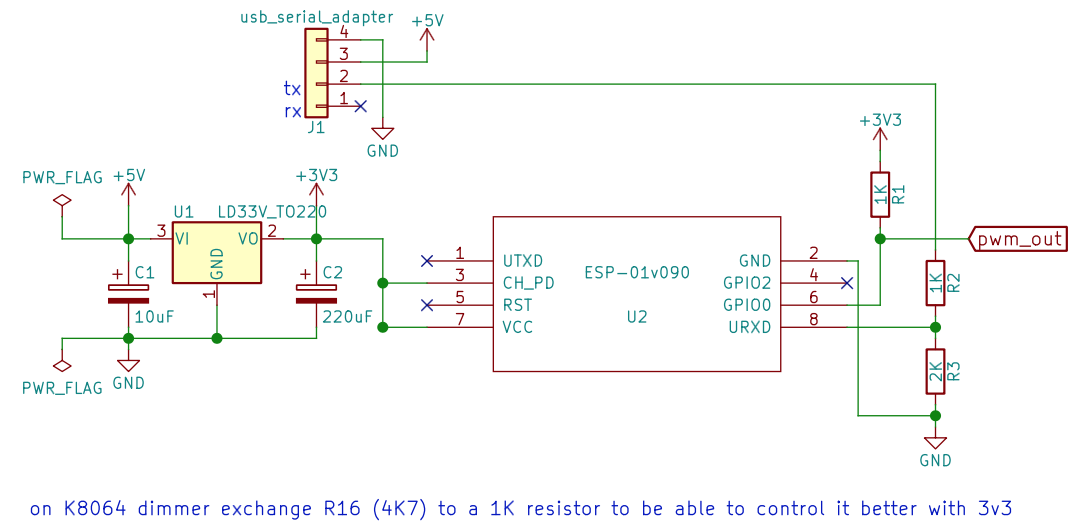f0dim
2017-11-22 00:34
electronics
This simple addition/hack lets me control the Velleman K8064 DC dimmer kit via wireless OSC or serial. It's based on an ESP8266. The kit is isolated, can dim 220V/110V and is rated for up to 750W loads.
Normally one control it using 0-12V but by replacing a resistor (R16) it's possible to do it with the 0-3.3V PWM signal that the ESP outputs.
I probably should cut some air ventilation holes, but so far it hasn't gotten hot inside.
Arduino code for the ESP8266...
//f.olofsson2017
// * install OSC from https://github.com/CNMAT/OSC
// * edit where it says EDIT below
// * choose board: "Generic ESP8266 Module" 160 MHz
//OSC protocol: /dim PWM fade
// PWM should be 0.0-1.0
// fade should be 0.0-1.0 (1.0=instant)
//serial protocol: 253 254 PWMhi PWMlo fadehi fadelow 255
// PWM hi and lo should be 0-1023
// fade hi and lo should be 0-1023 (1023=instant)
#include <ESP8266WiFi.h>
#include <WiFiUdp.h>
#include <OSCMessage.h>
#define PORT 15551 //receiving OSC port
#define PINPWM 0
#define PAYLOAD 4
#define UPDATERATE 16
#define TRIES 100 //how many times try check for wifi connection at startup
const char *ssid = "wifinetwork"; //EDIT your accessPoint network name
const char *password = "wifipassword"; //EDIT your password
const char *espname = "f0dim";
WiFiUDP Udp;
bool wifi;
byte serial_index = 0;
byte serial_data[PAYLOAD];
unsigned long next_time;
float dim = 0.0, dim_target = 0.0, dim_fade = 1.0;
void setup() {
analogWriteFreq(5000); //5khz pwm
Serial.begin(115200, SERIAL_8N1, SERIAL_RX_ONLY);
pinMode(LED_BUILTIN, OUTPUT);
pinMode(PINPWM, OUTPUT);
analogWrite(PINPWM, 0);
delay(10);
WiFi.mode(WIFI_STA);
WiFi.hostname(espname);
WiFi.begin(ssid, password);
byte cnt = 0;
wifi = false;
while ((WiFi.status() != WL_CONNECTED) && (cnt < TRIES)) {
delay(100);
cnt++;
digitalWrite(LED_BUILTIN, cnt % 2);
}
if (WiFi.status() == WL_CONNECTED) {
Udp.begin(PORT);
wifi = true;
}
digitalWrite(LED_BUILTIN, !wifi); //blue led on if connected to wifi
}
void oscDim(OSCMessage &msg) {
dim_target = msg.getFloat(0);
dim_fade = msg.getFloat(1);
}
void loop() {
//--serial input
while (Serial.available() > 0) {
byte val = Serial.read();
if ((serial_index == 0) && (val == 253)) {
serial_index = 1;
} else if ((serial_index == 1) && (val == 254)) {
serial_index = 2;
} else if ((serial_index >= 2) && (serial_index < (PAYLOAD + 2))) {
serial_data[serial_index - 2] = val;
serial_index++;
} else if ((serial_index == (PAYLOAD + 2)) && (val == 255)) {
dim_target = ((serial_data[0] << 8) + serial_data[1]) / 1023.0;
dim_fade = ((serial_data[2] << 8) + serial_data[3]) / 1023.0;
serial_index = 0;
} else {
serial_index = 0;
}
}
//--OSC input
if (wifi) {
int packetSize = Udp.parsePacket();
if (packetSize) {
OSCMessage oscMsg;
while (packetSize--) {
oscMsg.fill(Udp.read());
}
if (!oscMsg.hasError()) {
oscMsg.dispatch("/dim", oscDim);
}
}
}
//--fading
if (millis() >= next_time) {
next_time = millis() + UPDATERATE;
if (dim < dim_target) {
dim = dim + dim_fade;
if (dim > dim_target) {
dim = dim_target;
}
} else if (dim > dim_target) {
dim = dim - dim_fade;
if (dim < dim_target) {
dim = dim_target;
}
}
analogWrite(PINPWM, int(dim * 1023));
}
}
SuperCollider example code...
//f0dim can be controlled either via OSC or serial
n= NetAddr("192.168.1.105", 15551);
n.sendMsg(\dim, 1.0, 1.0); //set 100% instantly
n.sendMsg(\dim, 0.5, 1.0); //set 50% instantly
n.sendMsg(\dim, 0.0, 1.0); //set 0% instantly
n.sendMsg(\dim, 1.0, 0.001); //slow fade in
n.sendMsg(\dim, 0.0, 0.0005); //slower fade out
SerialPort.listDevices;
(
~port= SerialPort("/dev/tty.usbserial123", 115200, crtscts: true); //EDIT serialport
CmdPeriod.doOnce({~port.close});
f= {|pwm= 1023, fade= 1023|
Int8Array[253, 254, pwm>>8, pwm%256, fade>>8, fade%256, 255];
};
)
~port.putAll(f.value(1023, 1023)); //set 100% instantly
~port.putAll(f.value(512, 1023)); //set 50% instantly
~port.putAll(f.value(0, 1023)); //set 0% instantly
~port.putAll(f.value(1023, 3)); //slow fade in
~port.putAll(f.value(0, 2)); //slower fade out
~port.close;



